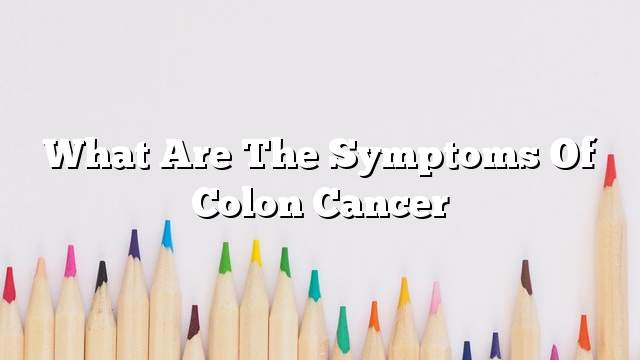Colon Cancer
Colon cancer is the cancer that starts in the colon or rectum and then spreads in the rest of the large intestine, which is the lower part of the digestive system in the body, after digestion, food moves from the stomach to the small intestine and colon, where the colon absorbs water and food from waste and The stool is then transferred from the colon to the rectum before leaving the body.
Most cancers of the colon and rectum are glandular, that is, cancers that begin in the cells that produce and excrete mucus and other fluids. Colorectal cancer often begins as a benign tumor called polyp, which may form on the inner wall of the colon or rectum. Over time these benign drugs may become malignant cancers, so these tumors must be found and removed initially in order to protect the body from colorectal cancer.
Colorectal cancer is the fourth most deadly type of cancer in humans, according to the World Health Organization in 2012, but the number of deaths from colorectal cancer has decreased with the use of colonoscopy and stool tests.
Symptoms of colon cancer
In the early stages of the disease, the symptoms of colorectal cancer may be very few, or nonexistent at all. As the disease progresses, the symptoms may increase in severity and severity, and because the symptoms of colorectal cancer often do not appear until the disease progresses beyond the initial stages , Regular screening is recommended for early detection, and colorectal cancer screening should be part of regular screening for anyone above 50 years of age. People under the age of 50 who have a family history of colon cancer or other risk factors should talk to their doctor about when Must Start regular screening of this cancer. The symptoms of cancer of the rectum and colon are divided into two parts:
Local colorectal cancer symptoms : Those that have a direct effect on the colon or rectum, and include:
- Changes in bowel habits, from constipation, diarrhea, or alternation between them, and this continues for more than several days.
- Hemorrhage or blood mixed in stool.
- Swelling, convulsions, or discomfort in the abdomen.
- Feeling that the intestines do not discharge completely no matter how the patient tries to get out.
- The thickness of the stool will be lower than normal.
Symptoms Of Colorectal Cancer : The ones that affect the whole body, include:
- Unwarranted weight loss.
- Anorexia is not justified.
- Nausea and vomiting.
- Anemia.
- Jaundice.
- Permanent weakness and fatigue.
Sometimes the cancer can block the intestine, which clogs up to show some of these symptoms:
All of the above symptoms can be caused by other conditions. Many diseases less serious than cancer may cause the same symptoms, such as hemorrhoids and inflammatory bowel disease.
Causes and risk factors for colon cancer
The main cause of cancer is generally unknown, but there are a range of conditions that may come together to lead to cancer. For colorectal cancer, the most common cause of cancer is the following:
- Age : Although colorectal cancer may affect people of all ages, chances of infection increase significantly after the age of fifty.
- Ethnic background : The rate of infection of Americans of African descent in the United States of the disease, in addition to the Jews of Ashkenazim.
- Obesity Weight gain increases the risk of colorectal cancer.
- Family history of colorectal cancer or benign drugs : Although the causes are not obvious in all cases, but gene inheritance, some common environmental factors, the combination of these factors may increase the risk of colorectal cancer.
- Inherited syndromes : Two of the most common inherited syndromes are associated with colorectal cancer, such as familial adenocarcinoma (FAP), inherited hereditary colon cancer (HNPCC), and some other syndromes, such as Lynch syndrome, Turko syndrome, and Poitzigers syndrome.
- Diet : A diet with high red and processed meat can increase the risk of colorectal cancer, as well as the bad habits of cooking meat at very high temperatures, resulting in chemicals that may also contribute to increased risk Infection.
- Lifeless lifestyle : Individuals living a sedentary lifestyle without physical activity increase their chance of developing colorectal cancer.
- Smoking : Some cancer-causing carcinogens are ingested, thus increasing the risk of infection.
- Alcohol abuse : Drinking too much alcohol and being addicted can lead to an increased risk of colorectal cancer.
- Inflammatory Bowel Disease (IBD): The presence of inflammatory bowel disease, including ulcerative colitis and Crohn’s disease, increases the chances of infection.
- Diabetes Type II : There may be an increased risk of cancer of the rectum if a person has diabetes, especially type II, and may also affect the consequences of cancer in case of injury.
the cure
There are different types of treatment for patients with colon cancer. It is possible to use one of the following treatments, and it is possible to use more than one treatment type at the same time:
- Surgery to remove the tumor and part of the colon according to the extent of the disease.
- Tumor resection by RF.
- Freezing.
- Chemotherapy.
- Radiation therapy.
